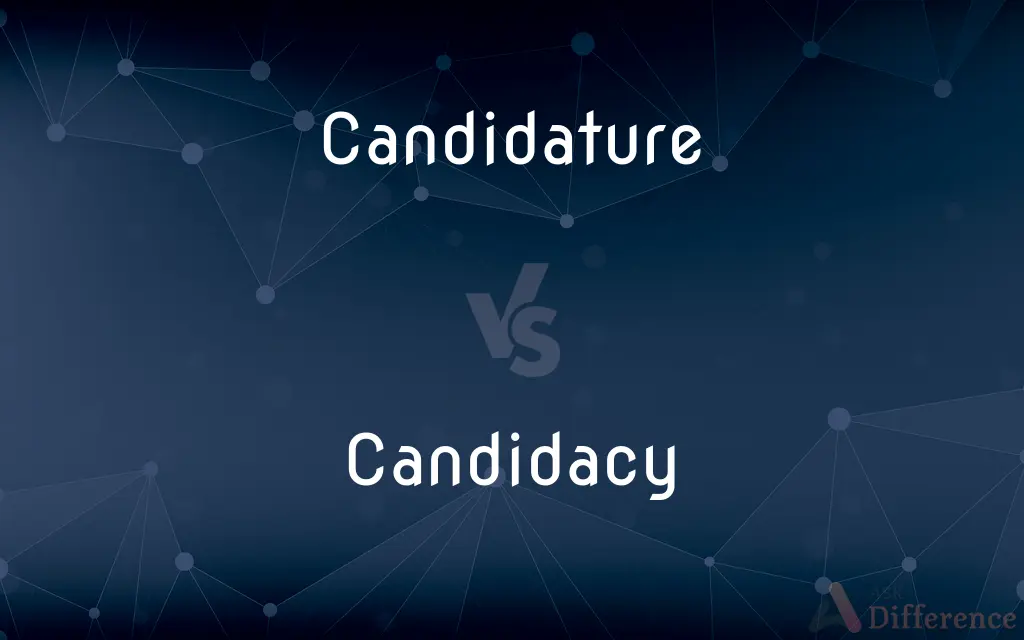Candidature vs. Candidacy — What's the Difference?
Edited by Tayyaba Rehman — By Fiza Rafique — Updated on March 10, 2024
Candidature refers to the state of being a candidate, especially in the context of academic or formal applications, while candidacy more commonly describes the condition of running for a political office or position.

Difference Between Candidature and Candidacy
Table of Contents
ADVERTISEMENT
Key Differences
Candidature is often used in academic and professional contexts, implying a person's status as an applicant or nominee for a position, award, or degree. It emphasizes the formal process of being considered. On the other hand, candidacy is more frequently associated with political campaigns and elections, highlighting the process and activities involved in seeking elected office.
While both terms describe the state of being a candidate, candidature carries a connotation of undergoing evaluation or examination, such as in the pursuit of a doctoral degree. Conversely, candidacy implies active engagement in a campaign or electoral process, focusing on the candidate's efforts to win support or votes.
The usage of candidature versus candidacy can also differ geographically, with some English-speaking countries preferring one term over the other in specific contexts. For example, candidature might be more commonly used in British English for academic positions, whereas candidacy is widely used in American English when referring to political contests.
In terms of formalities and application processes, candidature is often associated with submitting documents, meeting qualifications, and awaiting approval from a committee or board. This contrasts with candidacy, which involves public campaigning, policy promotion, and voter interaction as key activities.
The choice between candidature and candidacy can thus reflect the nature of the position being sought and the process involved. While candidature suggests a more passive, evaluative phase, candidacy involves active engagement with a broader audience or electorate.
ADVERTISEMENT
Comparison Chart
Common Context
Academic and professional applications.
Political campaigns and elections.
Connotation
Undergoing evaluation or examination.
Active engagement in a campaign or electoral process.
Geographic Usage
Varied, often preferred in specific English dialects.
Widely used across English-speaking countries, especially in American English.
Activities Involved
Submitting documents, meeting qualifications.
Public campaigning, policy promotion.
Focus
Formal process of consideration.
Efforts to win support or votes.
Compare with Definitions
Candidature
The condition of being a candidate for a specific academic or professional position.
Her candidature for the doctoral program has been approved.
Candidacy
The state of running for a political office or position.
She announced her candidacy for mayor early in the year.
Candidature
A term often associated with formal applications and evaluations.
The university requires a detailed proposal as part of the candidature process.
Candidacy
Involves active campaigning and engaging with the electorate.
His candidacy was marked by a focus on environmental policies.
Candidature
Indicates a more passive role in the selection process.
After submitting her thesis, her candidature was confirmed.
Candidacy
Emphasizes efforts to win support or votes.
During his candidacy, he visited numerous communities to understand their needs.
Candidature
Reflects a period of awaiting decision from a committee or authority.
His candidature for the fellowship is under review.
Candidacy
May involve public debates, policy promotion, and voter interaction.
The debate was a crucial moment in her candidacy.
Candidature
Used in contexts requiring qualifications and endorsements.
Applicants must submit their publications to support their candidature.
Candidacy
Reflects an active, competitive process.
His candidacy for the senate involved a rigorous campaign strategy.
Candidature
A person who seeks or is nominated for an office, prize, or honor.
Candidacy
Candidacy is a rite which takes place during Roman Catholic seminary formation, by which the Church recognizes the seminarian as worthy of being ordained (hence, they become a "candidate" for ordination to the priesthood). Permanent deacons in the Roman Catholic Church also go through Candidacy or being recognized as worthy of being ordained just before their ordination as permanent deacons.
Candidature
A student who has nearly completed the requirements for a degree.
Candidacy
A person who seeks or is nominated for an office, prize, or honor.
Candidature
One that seems likely to gain a certain position or come to a certain fate
Young actors who are candidates for stardom.
A memorandum that is a good candidate for the trash can.
Candidacy
A student who has nearly completed the requirements for a degree.
Candidature
The condition of becoming a candidate; candidateship.
Candidacy
One that seems likely to gain a certain position or come to a certain fate
Young actors who are candidates for stardom.
A memorandum that is a good candidate for the trash can.
Candidature
Candidacy.
Candidacy
The state of being a candidate; candidateship.
Candidature
The campaign of a candidate to be elected
Candidacy
The position of a candidate; state of being a candidate; candidateship.
Candidacy
The campaign of a candidate to be elected
Common Curiosities
Is candidature only used in academic settings?
Primarily, yes, though it can also apply to professional roles requiring formal evaluation or selection processes.
How do candidature and candidacy differ?
While both terms describe being a candidate, candidature is more associated with academic or professional applications, and candidacy with political campaigns.
Does candidacy always involve elections?
Candidacy typically involves running for an elected position, focusing on political offices or similar roles where election by a voting process is required.
What activities are associated with candidature?
Activities include submitting documents, meeting qualifications, and undergoing evaluation by a committee or authority.
Can someone have both candidature and candidacy at the same time?
It's possible if a person is applying for an academic or professional position while also running for a political office.
What is candidacy?
Candidacy describes the condition of running for a political office, emphasizing active campaigning, policy promotion, and voter engagement.
How is candidature evaluated?
Candidature is evaluated based on qualifications, submitted materials, and sometimes interviews or presentations to a deciding committee.
What is candidature?
Candidature refers to the state or condition of being a candidate, typically in academic or professional settings, focusing on formal processes of application and evaluation.
Can the terms candidature and candidacy be used interchangeably?
They can be used interchangeably in some contexts, but their usage often depends on the nature of the position being sought and the process involved.
How does geographic location affect the use of these terms?
Usage can vary, with certain English-speaking regions showing a preference for one term over the other in specific contexts.
What activities are involved in candidacy?
Candidacy involves campaigning, engaging with voters, promoting policies, and seeking public support.
Can the outcome of candidature and candidacy be influenced by public perception?
Candidacy is directly influenced by public perception and voter support, whereas candidature is more influenced by the evaluations of a specific committee or authority.
What makes a successful candidacy?
A successful candidacy often involves effective campaigning, clear policy proposals, and strong public engagement.
What is required to establish a candidature?
Establishing a candidature typically requires meeting specific qualifications and submitting necessary documents or proposals.
What is the focus of a candidacy campaign?
The focus is on winning voter support through policy promotion, public campaigning, and addressing electorate needs.
Share Your Discovery

Previous Comparison
Pilot vs. Driver
Next Comparison
Can vs. TinAuthor Spotlight
Written by
Fiza RafiqueFiza Rafique is a skilled content writer at AskDifference.com, where she meticulously refines and enhances written pieces. Drawing from her vast editorial expertise, Fiza ensures clarity, accuracy, and precision in every article. Passionate about language, she continually seeks to elevate the quality of content for readers worldwide.
Edited by
Tayyaba RehmanTayyaba Rehman is a distinguished writer, currently serving as a primary contributor to askdifference.com. As a researcher in semantics and etymology, Tayyaba's passion for the complexity of languages and their distinctions has found a perfect home on the platform. Tayyaba delves into the intricacies of language, distinguishing between commonly confused words and phrases, thereby providing clarity for readers worldwide.














































